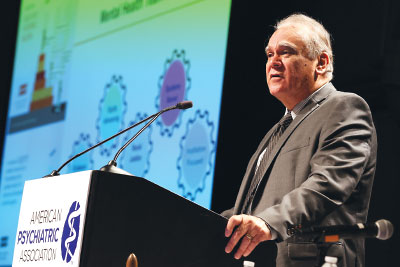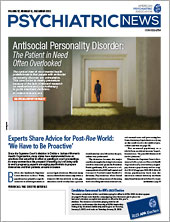David Acosta, M.D., began his keynote address at APA’s 2022 Mental Health Services Conference by channeling Albert Einstein and invoking his famous quote: “Insanity is doing the same thing over and over and expecting different results.”
“The pandemic has shown us that we can’t do anything alone and we have to break down the silos in academia, but also in our health care delivery systems as well,” he said. “It’s time to begin to look at adjusting, deconstructing, and possibly even creating new systems-based solutions.”
Acosta is the chief diversity and inclusion chair at the Association of American Medical Colleges (AAMC). During his address, he broke down the challenges that people of underrepresented backgrounds face within academic settings, focusing on the lived experiences of students, faculty, and staff. Creating a climate of true equity and inclusion requires work on everyone’s part, he said, especially institutional leaders.
“Our institutions are microcosms of society,” he said. “The increased sentiments that we’ve seen around us—the antisemitism, anti-LGBTQ+, anti-immigration, Islamophobia—those are all contributing to what we bring to the bedside every day.”
Acosta shared data on the challenges that medical students, residents, and physicians of historically excluded or underrepresented backgrounds face. In the AAMC’s annual Medical School Graduation Questionnaire for graduating medical students, 40% of students in 2021 reported experiencing any of 16 behaviors, including public humiliation and discrimination based on gender, race, sexual orientation, or other personal traits or beliefs. A study published earlier this year found that nearly one-fourth of physicians who work in a large academic medical center have experienced mistreatment, such as sexual or verbal harassment or abuse (
Nearly One-Fourth of Physicians in Large Academic Medical Center Experienced Mistreatment).
“I believe that we have an obligation to at least explore, to listen, and to try to understand the lived experiences that some of our students, residents, faculty, and staff have been facing and how it has impacted them mentally and physically,” Acosta said. “This is a time when I think that we, as medical educators and leaders in mental health, must place a deeper emphasis on trying to transform our culture and the climate of our institutional learning workplace environments.”
Transforming medical education to become truly inclusive begins with having a vision of what true inclusion looks like. The AAMC created the Foundational Principles of Inclusion Excellence to create a framework for leaders to create true diversity, equity, and inclusion. Institutions that have implemented these principles create a sense of belonging, in which everyone feels that they are part of the fundamental fabric of the organization.
“But more importantly, they feel that they’re trusted and that there are opportunities for them to reach their full potentials, and that occurs because they feel that authenticity and intersectionality are valued,” he said. Students, faculty, and staff in these institutions feel they can bring their full selves to the table with the multiple identities and perspectives they have without being judged or fearing retaliation.
Starting the effort to transform an institution so that it is truly inclusive can be daunting, Acosta said. But he quoted the late Rep. John Lewis when he explained that the status quo must be disrupted to create inclusivity: “Never, ever be afraid to make some noise and get in good, necessary trouble.”
Leaders need to use their powers, voices, and privilege to dismantle the systems of mistreatment, harassment, and racism in medicine, he said. They must advocate for systemic changes and lead the way collectively to permanently eliminate systemic racism and exclusionary practices within the health care system.
“We need transformational change in order to achieve equity and racial justice in our learning and workplace environments,” Acosta said. “Equity-centered medical educators and mental health team leaders recognize the persistent inequities that our system has, especially in our educational system. And they understand that we as leaders have an obligation to begin addressing those inequities, and the fallout that they create for our students, our faculty, and our staff. They are change agents. And they use this mindset in order to act for change.”
Institutions can promote racial equity and justice by establishing units that specifically address these and other inclusion issues, standardize the way data are collected to enable analysis across institutions, and go beyond what Acosta referred to as “the best and the brightest” mindset. “Enroll those who have demonstrated meaningful service to humanity, not just their academic prowess.”
“I do believe that we have the power to change and to shape the workforce of the future and to shape our learning environments of the future,” Acosta continued. “It’s going to take deliberate effort, and it’s going to take actionality.” ■

